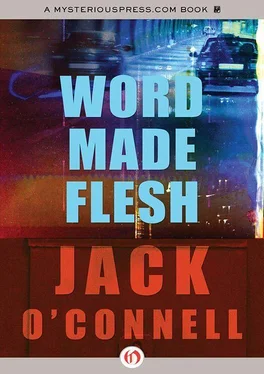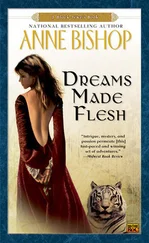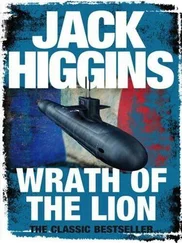Meyrink moved to a worktable without taking his eyes off Alicia. He picked up a pair of rubber gloves and made a production of stretching them over his hands.
“Everyone needs a release,” he said, contorting his fingers into latex. “A way of calming themselves. Of leaving the pressures of the job. Retreating from the jostling of the outside world in general. That’s my feeling, at least.”
He moved back to the girl and stood before her, examining her body as if it were a canvas filled with some difficult work of art, some new form that takes effort on the part of the viewer before it will give up its hidden meanings. He stepped back, moved his head from shoulder to shoulder, squinted his eyes. He walked a full circle around Alicia, slowly, stopping for a moment when completely behind her and making a number of snorting and sniffling noises.
When they came face-to-face again, he was nodding, smiling, pleased by something he seemed to have confirmed.
“Very good,” he said, probably to himself. “Just fine. Wonderful texture. No major blemishes. Tremendously supple.”
He lifted a hand to her cheek for the first time, brushed back to her ear, then adjusted her hair behind the ear.
“You are wonderful,” he said to her. “You’ve taken care of yourself. I can’t tell you how pleased that makes me. So many of the young people today, with the cigarettes, the sun worshiping. The alcohol while still in their teens. And then, these days, the body piercing. My God, not just the ears, mind you, but the nose. The tongue. I have even heard they desecrate the nipple.”
He walked back to a workbench, shaking his head as he went. He opened some of the cupboards and began to take down tools and place them on the table.
“I consider it a form of self-mutilation,” he said. “And I know all the arguments. The talk of expression and rebellion. But I think this is the nonsense of youth. I think we’re seeing the herd mentality. I will put a ring through my nose because Ottla down the block put a ring through her nose. So much nonsense.”
He stared up into a cupboard for a moment, apparently looking for something, then closed the cabinet door and walked back to face the girl.
“I would love to take the tape off. But I have neighbors, of course. And though the house is well insulated, I’m a man who does not enjoy taking chances.”
He ran a thumb across her covered lips.
“I know it can be difficult breathing this way. But concentrate and you will find a rhythm. It will begin to feel natural, I promise you.”
He took her face by the chin and turned it side to side, inspecting the neck. From here he began to run both his hands around the neck, poking mildly with the thumbs like a doctor checking swollen glands. He moved down her body, over the shoulders, down over the breasts, up under the arms, turning the arms back and forth as wrists rubbed against manacles, all of it very clinical and methodical, in much the same manner that the state nurses inspect the refugees at the border train stations.
“While I’m apologizing, I should also tell you how much I regret these gloves. A problem for both of us, in the tactile sense. So sterile and cold. But in this day and age, what can I say? It’s a matter of safety. Of hygiene. You must see that. An intelligent young lady like yourself. You can’t take the kind of risks that we would have disregarded in the past.”
He spent a good ten minutes inspecting her body, half of that time down on his knees and behind her. From time to time he pinched and poked, pulled skin out from its natural fall over the bones. He even ran a finger in and out between her toes. When he was finally done, he struggled back up to standing and gave her buttocks a playful slap before walking back to the work-bench and extracting two or three more implements from the cabinets.
“You look healthy as a horse,” he called from across the room, taking a grindstone down from a shelf and climbing onto a stool.
“I mean that, of course, as a compliment,” as he selected a midsize skiving knife and began to sharpen its blade against the stone. “Your color is exemplary. No sign of jaundice at all. You have to understand, we, on the outside — outside the Schiller, I mean — we’ve heard so much about the effects of a poor diet, the results of malnutrition and such. You begin to accept it as fact. But obviously, your environment did no lasting damage to your body.”
He stopped sharpening and turned his head to look at her, saying, “Nor your mind.”
He put the knife down gingerly and picked up the manuscript, slid off his stool and approached the girl once again.
“It’s a stunning achievement,” he said, holding the stack of paper up for her to see. “What you have done is simply amazing, my dear. You are a very talented artist. A writer of the first degree. This is my opinion and, certainly, I am not a trained critic. But as they say, I know what I like. I know what I am impressed with. Do you know the shock that would ripple through our city if others saw what you were capable of? A little guttersnipe from the Schiller, barely old enough for the violet passport? I’ll tell you this, they wouldn’t believe it. There’s a very prejudiced mind-set out there, darling. You must trust me on this. I have more experience. I have lived more years and traveled widely through the strata of Maisel society. The bulk of my people could not accept it. This kind of achievement from the vermin of the Schiller. Impossible. This is what they would say. I swear it. I have the proof here in my hands, but it would do no good.”
He brought the manuscript back to the workbench and deposited it there, brushing off the top sheet gently, then pausing to reread a few opening lines.
“You have done no less than create — with just ink and scraps of cheap, horrible paper — a totem. Do you know what that is, my child? You may well. I would put nothing past you. Not after reading your art. Think of this. In just three days, without study or planning. Without help or advice or a mentor who might have steered you along your course. Without an aesthetic skeleton. Without an envelope filled with a lifetime of notes. Without the slightest indication that there was a single reason to even do so, you have created a bomb. That’s what this is, my love. That is exactly what we must call this messy pile of paper. A bomb. A bomb that goes off, again and again, an explosive device whose trigger is the eyes of any and every reader to pick it up and take in the first words. It is an epiphany bomb. Are you familiar with this word, child? No? No matter.
“We could talk of an idiot savant. But I know this is not the case. Your extraordinary talent was not given at the expense of normality. This is self-evident to me. You are a beautiful young rose that has grown in the midst of the sewer heap that is the Schiller. You were put here, “in all your beauty,” his finger pointing out at her, in all your innocence and your wisdom, to make me into an everlasting symbol. Because of you, I will always be here, unadulterated in my darkness.
“I don’t mean to be melodramatic, my friend. But surely the moment calls out for it. You have created from nothing a world of written language, ink on paper, a cosmology of symbols, the sum of whose parts is entirely greater than the graphic signs themselves. You have forged the manifestation of reality through your little story. How proud you must be, child. How proud your family and friends, your whole community would be, if only your story had never taken place, yes? It’s an awful irony. Even a paradox — if they exist, there is no story to be proud of; if they die, there is no one to be proud.
“But I will be proud for them, young lady. I will do your masterpiece justice. You must trust me on this. I could show you my own best work, but it would pale in comparison to your triumph, believe me. I would be embarrassed just to parade my paltry craftsmanship before the eyes of such genius. And besides, past work does not really ensure success in the future, because each project is a job unto itself. We never know what the result will be like. But we will do our best. This is all we can do. Don’t you agree? We give what we have, not what we have not. Our doubt is our passion, as someone once said.”
Читать дальше












